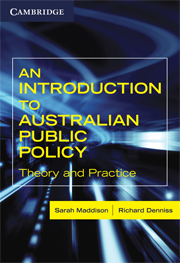Book contents
- Frontmatter
- Contents
- List of figures
- List of tables
- List of case studies exercises, and original contributions
- Foreword
- PART 1 Policy and theory
- Introduction
- 1 The australian policy context
- 2 State or market I: Ideology and public policy
- 3 State or market II: The economics of public policy
- 4 Models and theory for understanding policy
- 5 Policy actors and policy instruments
- 6 Identifying issues: Agenda setting and policy discourse
- PART 2 Policy in practice
- References
- Index
- References
3 - State or market II: The economics of public policy
- Frontmatter
- Contents
- List of figures
- List of tables
- List of case studies exercises, and original contributions
- Foreword
- PART 1 Policy and theory
- Introduction
- 1 The australian policy context
- 2 State or market I: Ideology and public policy
- 3 State or market II: The economics of public policy
- 4 Models and theory for understanding policy
- 5 Policy actors and policy instruments
- 6 Identifying issues: Agenda setting and policy discourse
- PART 2 Policy in practice
- References
- Index
- References
Summary
‘The ideas of economists and political philosophers, both when they are right and when they are wrong, are more powerful than is commonly understood. Indeed the world is ruled by little else. Practical men, who believe themselves to be quite exempt from any intellectual influence, are usually the slaves of some defunct economist.’
John Maynard Keynes (1936: 383)Governments choose to intervene heavily in some markets and lightly in others. The sale of heroin is forbidden in Australia while the sale of alcohol is heavily regulated. Advertising tobacco in Australia is illegal but advertising junk food to children is allowed. While the choices available to policy makers are often framed in terms of a preference for ‘free markets’ or ‘regulation’, the reality is much more subtle, and more interesting.
This chapter considers the role of economics in influencing the choice between state provision of services, market provision based on a belief in Adam Smith's (1776) ‘invisible hand’, and the myriad of regulatory structures that can exist in between. The chapter begins with an overview of some major economic concepts that are useful for most policy workers, and considers the economic arguments regarding when markets are likely to be more or less effective in solving policy problems. To conclude, the role of economic language in framing, and influencing, policy debates is discussed.
What is economics?
Economics is concerned with the efficient allocation of resources (see Samuelson 1951; Katz & Rosen 1994; McTaggart et al.
- Type
- Chapter
- Information
- An Introduction to Australian Public PolicyTheory and Practice, pp. 57 - 81Publisher: Cambridge University PressPrint publication year: 2009



